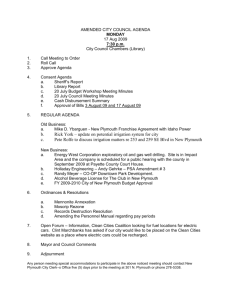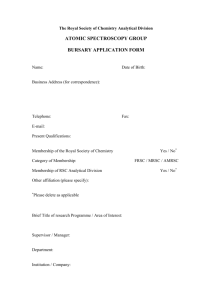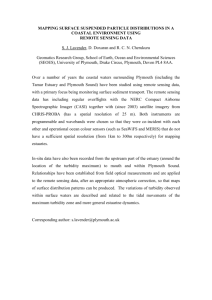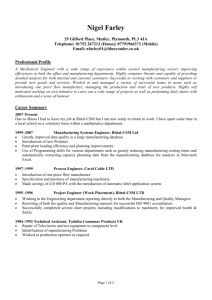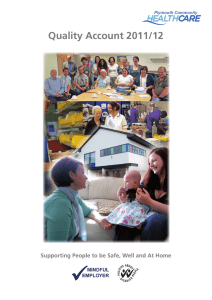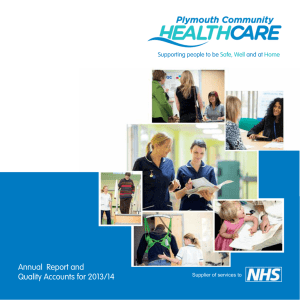Shaping our Future - Plymouth City Council
advertisement
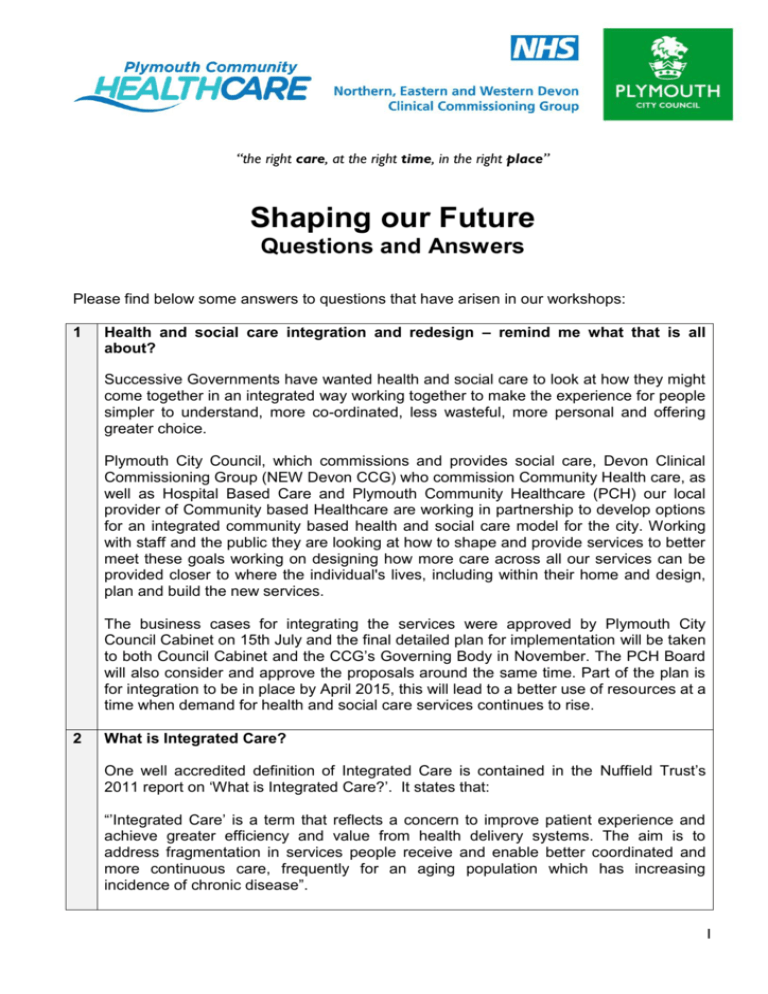
“the right care, at the right time, in the right place” Shaping our Future Questions and Answers Please find below some answers to questions that have arisen in our workshops: 1 Health and social care integration and redesign – remind me what that is all about? Successive Governments have wanted health and social care to look at how they might come together in an integrated way working together to make the experience for people simpler to understand, more co-ordinated, less wasteful, more personal and offering greater choice. Plymouth City Council, which commissions and provides social care, Devon Clinical Commissioning Group (NEW Devon CCG) who commission Community Health care, as well as Hospital Based Care and Plymouth Community Healthcare (PCH) our local provider of Community based Healthcare are working in partnership to develop options for an integrated community based health and social care model for the city. Working with staff and the public they are looking at how to shape and provide services to better meet these goals working on designing how more care across all our services can be provided closer to where the individual's lives, including within their home and design, plan and build the new services. The business cases for integrating the services were approved by Plymouth City Council Cabinet on 15th July and the final detailed plan for implementation will be taken to both Council Cabinet and the CCG‟s Governing Body in November. The PCH Board will also consider and approve the proposals around the same time. Part of the plan is for integration to be in place by April 2015, this will lead to a better use of resources at a time when demand for health and social care services continues to rise. 2 What is Integrated Care? One well accredited definition of Integrated Care is contained in the Nuffield Trust‟s 2011 report on „What is Integrated Care?‟. It states that: “‟Integrated Care‟ is a term that reflects a concern to improve patient experience and achieve greater efficiency and value from health delivery systems. The aim is to address fragmentation in services people receive and enable better coordinated and more continuous care, frequently for an aging population which has increasing incidence of chronic disease”. 1 3 What are the aims of the redesign? The aim is to develop an integrated community service for Plymouth across health and social care to enable us to deliver the right care, at the right time, in the right place. There has been a lot of public and patient consultation and engagement over recent years and the messages are clear – people want us to look at ways of shifting care closer to home for patients, rather than always in a hospital. We need to improve people‟s experience and outcomes through integration of pathways of care and processes between acute, community and social care, putting people at the heart of decisions about their care, and promote independence, choice, and control. We also need to improve the speed and responsiveness with which we can react and support escalation of need for the individual to prevent admission, create earlier opportunity for discharge and achieve ever improving levels of morbidity, mortality and social integration. 4 How will we make sure what we are changing is right for people and their families? The aim is to introduce services that have a clear and positive impact on the people who use our services. We intend to continue to engage with the public through a range of events to share information and gain views as our possible future models of care and support emerge. 5 How will we know how many people will need the revised service? Work is underway on identifying the numbers of people currently using all services across health and social care. We need to get a feel for the level of referrals to these services, the number of people needing input on discharge and for how long, before they then become planned work again. This will then help us design a „right size‟ and scope the numbers of staff we need where. 6 When is this all going to happen? We are being asked by our commissioners to suggest some new ways of delivering care to be in place by April 2015. We will have options to consider by November 2014. The changes will then require significant planning and implementation ready for a new service to be introduced during 2015 / 2016. 7 How do I get my views heard? You can feedback your views anytime via the dedicated Integration Intranet pages in the PCC, CCG and PCH. We will also be building on the workshops that have already taken place with further sessions and events. We would welcome your views, feedback and ideas and will collate and add to the FAQ‟s. 8 What are the financial drivers behind the project? With an ever growing population with more and more complex needs, the national budget for health and social care is under immense financial pressure. There is little new money. We are therefore asked to constantly review what we are doing and see if there are ways in which we could organise and make care less duplicated. Where pieces of work need investment however, we can at times, get help to achieve this. Innovation is often ripe for grant applications and awards and depending on what we aim to design, we can be chasing sources of top up money at various stages. Fundamentally however, the cost of acute care is the most expensive in our system, if we can show we can keep more people safely at home, on a scale so far not achieved, it is hoped that we will eventually attract a shift of resources around our system. 9 How does this work link with work being done at Plymouth Hospital NHS Trust? As part of understanding who needs their care provided differently, we also need to look at how we might use a frailty scoring tool to identify people at the acute setting and in the community. This will then help us to look at how to join up documentation across the various care pathways. We are creating a booklet that follows people across their health and social care journey. This will eventually be on an IT system that can be accessed by all health and social care professionals. 10 What can we learn from anywhere else? We are very keen not to reinvent the wheel if there are good ideas and practice elsewhere. We would be keen to hear from you if you have experienced working in other areas of the country where integration has worked well or working practices were different but were successful. We are organising a visiting team to go to Oxford, Cornwall and Torbay to see how they implemented similar system changes and to learn from them. 11 Will there be a review process built into the change? Yes there will and we will build in an engagement process with staff and the public once a sensible amount of time has lapsed following implementation. We will look to continually review our processes in order to ensure that we deliver the best possible outcomes for people and our staff. 12 How will this affect PCH and its staff? The potential movement of Plymouth City Council adult social care staff to PCH is positive for PCH – it helps to expand the organisation and to safeguard its future and the future of its staff. As part of the change PCH are not looking to make redundancies, however it‟s important to understand that some staff‟s roles and places of work might change significantly. We will at all times follow organisational change policies as well as promoting every opportunity for staff to make positive choices for themselves with support from HR and unions. 13 So what will a redesigned service look like? We are running programmes of work that bring teams together across ward, community, primary and social care settings to work up ideas and models of care that will work for the people of Plymouth. The resulting new service model will be available in November. These cost of these designs and the implications on staff numbers, roles and responsibilities as well as locations of work, will be assessed and written up. We will very actively run meetings with staff affected, with HR, union representatives and staff side, to keep everyone in touch as much as possible with how this work progresses. 14 Is there any resource for this? The Council and its partners have been given some money this year to deliver the project work and test any new ideas. We need to show how reorganising who we have and how we work can reduce duplication and work more seamlessly across teams. If we can make a big impact, it may eventually be possible to look at money shifting across the system to meet needs in community settings rather than the acute, but we need to be able to demonstrate this impact first. 15 Who makes the final decision about what the design looks like? After all the workshops and public engagement, the project team will develop a proposal for the Executive Team and Plymouth Community Healthcare Board, CCG Governing Body and PCC Cabinet. Dave Simpkins Assistant Director Co-operative Commissioning & Adult Social Care Plymouth City Council Nicola Jones Head of locality programmes Western Locality NEW Devon CCG Michelle Thomas Director of Operations Plymouth Community Healthcare

